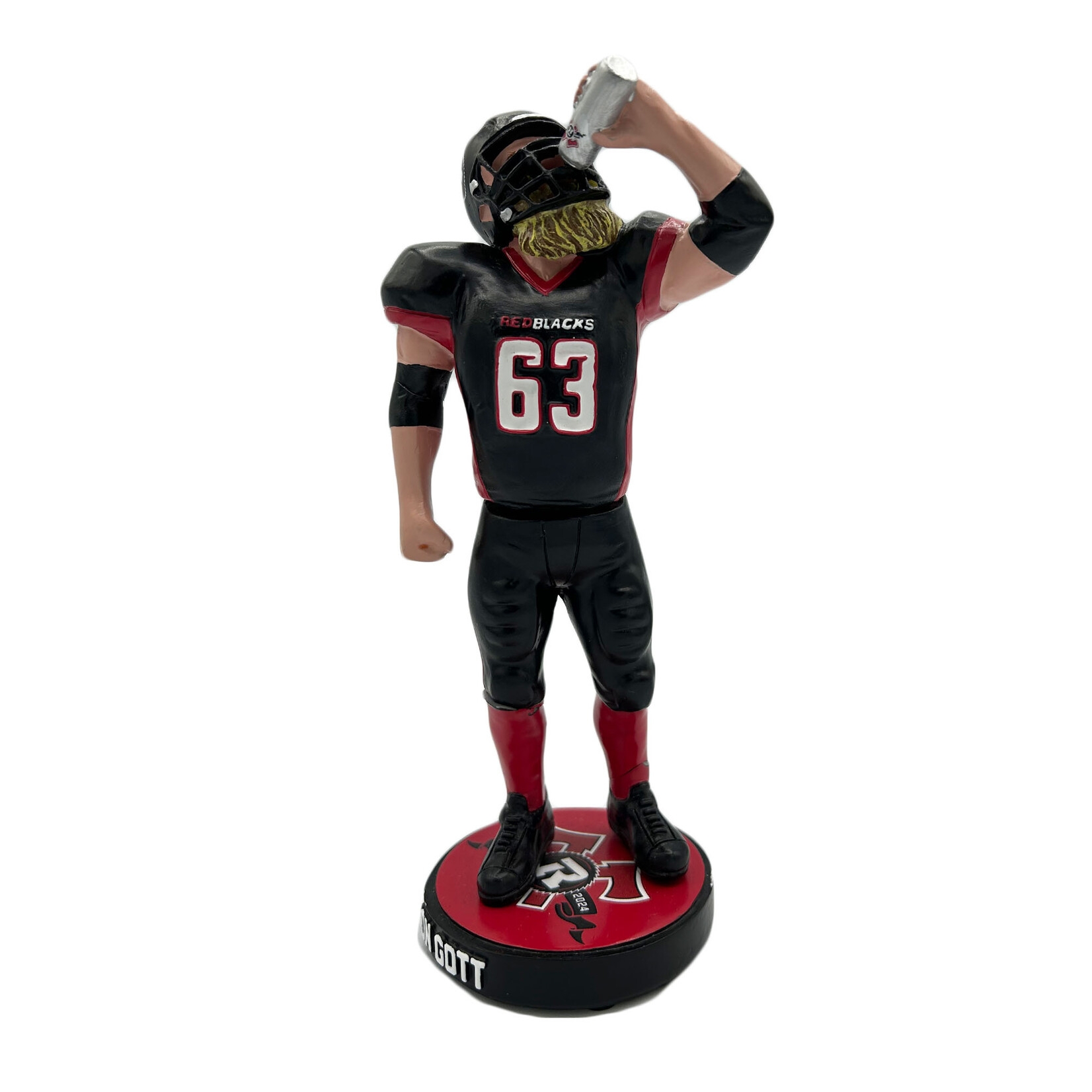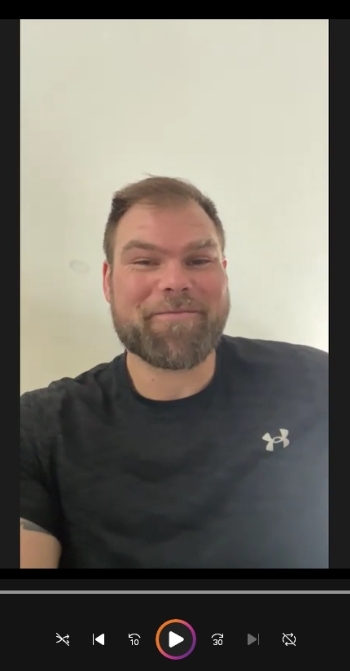Jon Gott had an impressive 10-season run in the CFL, making a name for himself as a powerhouse offensive lineman and a true leader on the field. Growing up in Edmonton, he played his college football with the Boise State University Broncos. In 2009, Jon was drafted by the Calgary Stampeders, where he spent five successful seasons. Then, in a pivotal move, he was traded to the Ottawa Redblacks for the first overall pick in the 2014 CFL Draft.
As a key player on the Redblacks’ offensive line, Jon was instrumental in their success, making three Grey Cup appearances in just four years and taking home the championship in 2016. His standout performance earned him Eastern All-Star honours in 2015 and 2016, as well as the East Division’s Most Outstanding Lineman in 2016.

Having said all that, Jon was an offensive centre. A poem by our own Bob McKeown, himself a centre, illustrates their lot in football life:
The life of an offensive centre
Is one that few would want to enter.
He snaps the ball …
He hears a roar…
Is it a fumble or is it a score?
And though he performs amazing feats …
You know what gets photographed?
His cleats.
But Jon erased that image of the centre forever with his iconic touchdown celebration during the 2018 season finale. In a moment that captured the spirit of the man, he ran to the back of the end zone, chugged a beer, and smashed the can on his helmet! This unforgettable act went viral across North America (Chug away: CFL Redblacks Gott’s beer chugging celebration) and has even been immortalized in a bobble-head figurine.
Although Jon’s last CFL season was in 2018, he signed a contract with in 2022 with Ottawa and retired as a Redblack. We recently caught up with Jon and had the opportunity to find out what he’s been up to:

I’ve been all over this country, once again! Once I retired from playing with Ottawa, I moved back to Kelowna, BC with my girlfriend at the time ’cause she was from there and I lived in BC for five years. And then Kelowna became too expensive, decided to come back!
I moved back about a year ago. It just felt like the right time to leave. It’s funny—ever since I left high school and my parents’ house, I’ve had this pattern of staying in one place for five years before moving on. I spent five years in the city after high school, then went to Boise State for college and stayed there for five years. After that, I got drafted by Calgary and spent five years there, followed by another five years in Ottawa. When that ended, I moved to Kelowna for five years. Now, I think I’ve finally found the place I want to settle down. We’re hoping to stick it out here for the long haul.
I’m working as a police officer with the Ottawa Police Service. I’m on front-line patrol and just started out. I’m based in the West End of the city—covering areas like Kanata, Bells Corners, Nepean, and Barrhaven.
There have been quite a few moments when I’ve thought, ‘This is why I became a cop.’ It’s a very rewarding job. Of course, like any job, there are tough times, but for the most part, it’s exciting and fulfilling. Every day is different—it’s not a typical 9-to-5 job where you’re stuck behind a desk doing the same thing over and over. It really keeps you on your toes.
After bouncing around from town to town during my time in the league, I realized there are two ways you can go. Some guys transition into desk jobs, but for me, that would’ve been really hard. I’m one of those people who needs to stay active, always moving and doing something. Being stuck behind a desk would drive me crazy—I think I’d lose my mind.
I’m just trying to take it one shift at a time and focus on learning right now. There’s so much to take in when you become a police officer. For the next few years, my goal is to absorb everything I can. Hopefully, along the way, I’ll discover something that really intrigues me and pursue that path. But for now, I’m just taking it all in.

Yeah, there have been a couple of instances where people noticed my last name on my uniform and put two and two together. For the most part, it’s been awesome.
Oh, I had a very fortunate career. It started back in high school—I went to a school that, almost every year I was there, sent one or two players to the States on full-ride scholarships. That really set things in motion for me. From there, I went to Boise State. At the time, they were just starting to make a name for themselves—they were kind of under the radar. But while I was there, we exploded onto the scene, and suddenly everyone in the country knew about us. We went to a bowl game every year, and most people know about the Fiesta Bowl against Oklahoma in 2007. That game really put Boise State on the map.
After that, I was drafted by Calgary, which was an incredible experience. They had the right culture, and it’s where I learned how to be the football player I was.
Some of the best moments of my career were in 2015. That season was something else—I’ve never had a season like that before. Every offensive lineman played all 18 games—not one guy got injured or missed a game. The players, the coaches—everything just clicked that year. It was the definition of family. When people talk about team cohesion, that was it. Sure, other years people would say it’s like a family, but you’d still have those moments where you felt like you were just a part of a team. But 2015 was different.
It was a big leap from the early days of the club in 2014 when we were just a bunch of individuals thrown together. Back then, we weren’t really a team yet. We were getting there, even though we were getting blown out a few times. But, honestly, even in that first year, it wasn’t like we were being blown out of every game. Most of the games were close. I think it was more about the scheme at times, because you always have the players—it’s just a matter of how everything comes together.
Speaking of that first year, there really wasn’t a core group of players. They just picked guys from different teams and kind of threw them together. We weren’t given any extra time to build chemistry as a team. It was straight from training camp right into the season. Luckily, we won that first game, but after that, things went downhill.
It was one of those experiences you have to go through to truly understand. Losing so much really takes a toll on you, and it teaches you where you don’t want to end up again.
But the change from 2014 to 2015 was huge. The owners, like Jeff Hunt, were fantastic. Jeff was at practice almost every day during training camp. You could talk to him, and he did so much to bring the team together. It was great having him around—he was a phenomenal owner. I know he’s not with the team anymore and has moved over to the soccer team, but he’s still doing fantastic things in the community. He’s a real asset to local sports, for sure.
It’s not even about the Grey Cup. It’s the everyday interactions, especially the ones after the game, that really stood out to me. I think those moments were huge in building support for the team. Not many stadiums or teams allow fans onto the field right after the game to interact with players. Seeing how much it meant to the kids, and how big a moment it was for them, was incredible. It was great to be a part of that with the team. It’s one of those memories you carry with you and never forget.
The locker room—it’s hard to describe, but so many people ask, ‘Why is the locker room so special?’ It’s those daily interactions, the time you spend together. During the season, you’re with your team more than your family. On road trips, you could be together for 16, even 24 hours a day. You build this incredible camaraderie and forge friendships that last a lifetime. Some of my closest friends are guys I played with in Ottawa, and we still stay connected all the time.
Ever since I was a kid, I kind of felt like I wanted to be a police officer. Then, as an offensive lineman, my primary goal was always to protect—whether it was the quarterback or the running back—and make them look good. It’s one of those roles where no one really notices you on the field. They don’t see you blocking or recognize who you are; they just see a pile of players. It’s always the quarterback, the receivers, or the running backs who get all the accolades, and that’s the best part for me. I could stay behind the scenes, do my job, and focus on my role.
That mindset—protecting and serving—naturally led me into policing. It’s the same mentality, just applied in a different way.
When I retired, I decided to take a break. When you’ve been doing something for half your life, it can leave you feeling a bit burnt out. I took about a year and a half where I didn’t really do anything related to football. I didn’t watch games or get involved in any way. Then, while living in Kelowna, I got the urge to get back into the game and started coaching the junior football team there, the Okanagan Sun. I coached for a couple of years, about three in total, and in my second year we won the national championship.
What stood out to me most was working with the kids. Many of them didn’t have the grades for university or had flunked out, and they were using this as a second chance. Helping them develop and prepare for university again—or even seeing some of them go straight to the CFL—was incredibly rewarding. It was definitely a big change from playing because there’s always that urge to be out there on the field. But watching the kids grow and improve was even more exciting for me. Seeing them excel was where I found the most joy.
I did that for a few years, but right now, I’m not really involved in the football world. I think I’ll get back into it at some point, but for now, I’m focusing on my career. But you know what? Coaching is incredibly rewarding. It requires a lot of time and commitment, but in the end, seeing the kids excel and enjoy the game makes it all worthwhile. I was one of those kids at one point, so it’s fulfilling to give back and help them experience the same joy that I once did.
After years of moving across Canada and building a successful career in professional football, Jon has found his way back to Ottawa to embark on an exciting new chapter as a police officer. His deep-seated commitment to protecting and serving naturally evolved from his time as an offensive lineman, where his role was to shield and support his teammates. Reflecting on his football journey, Jon cherishes the memorable moments that deepened his passion for the sport and the lifelong friendships forged through the unique camaraderie of the locker room. Welcome home, Jon!